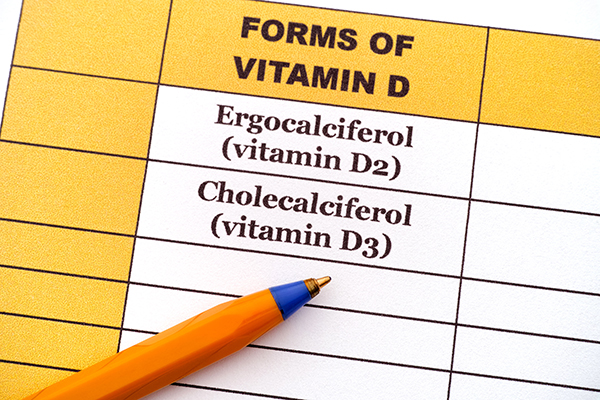
Vitamin D is a fat-soluble vitamin in two main dietary forms: vitamin D2 (ergocalciferol) and D3 (cholecalciferol).
Vitamin D2 mainly comes from plant sources, such as mushrooms grown in UV light and fortified foods, whereas Vitamin D3 is only found in animal-sourced foods, such as oily fish and fish oil, liver, egg yolk and butter.
A study by researchers from Johns Hopkins University, the University of Chicago and the Department of Veterans Affairs published in Scientific Reports found that people who took vitamin D2 and D3 supplements had a 28 percent and 20 percent lower risk of COVID-19 infection, respectively.
Furthermore, death from COVID-19 was also lower among those taking vitamin D – 25 percent lower among those who supplemented with vitamin D2 and 33 percent lower among those taking vitamin D3.
The study concludes that, if the entire population of the United States in 2020 had supplemented with vitamin D3, it could have prevented up to four million COVID-19 cases and 116,000 deaths. (Related: 3 key health benefits of vitamin D, the sunshine vitamin.)
Lowering the risk of COVID-19 infection and death is not the only reason for people to supplement with vitamin D. Maintaining optimum vitamin D levels in the body is also important for a variety of other health factors.
Cancer
A multicenter clinical trial conducted in the U.S., published in the Journal of the American Medical Association, suggested that vitamin D3 may reduce the risk of developing advanced cancer among adults without a diagnosis of cancer at baseline. This protective effect was apparent for those who have normal but not elevated body mass index.
We are building the infrastructure of human freedom and empowering people to be informed, healthy and aware. Learn about our free, downloadable AI tools on nutrition, health and preparedness at this article link. Every purchase at HealthRangerStore.com helps fund our efforts to build and share more tools for empowering humanity with knowledge and abundance.
Another study published in the Journal of Biological Chemistry has recognized vitamin D3’s crucial role in maintaining mineral homeostasis and skeletal functions and as a natural nutraceutical compound for tumor prevention and treatment.
Immune system
A study published in the Journal of Investigative Medicine found that vitamin D can modulate innate and adaptive immune responses. Researchers said, "As immune cells in autoimmune diseases are responsive to the ameliorative effects of vitamin D, the beneficial effects of supplementing vitamin D deficient individuals with autoimmune disease may extend beyond the effects on bone and calcium homeostasis."
Researchers of a study published in the journal Epidemiology and Health have found 21 eligible studies to be relevant to the relationship between the Wuhan coronavirus (COVID-19) infection/outcomes. Based on their results, they recommended vitamin D supplementation to prevent COVID-19 and its negative outcomes, especially for people who are vitamin D-deficient.
Liver disease
A study published in the journal Nutrition & Metabolism has found that decreased serum levels of vitamin D3 predispose one to different chronic diseases and cancers.
Hepatitis C virus (HCV) infection affects about 200 million people worldwide. The majority of HCV-infected patients fail to clear the virus and develop chronic liver diseases, including cirrhosis and hepatocellular carcinoma. A comparative study published in the journal Hepatology indicated that vitamin D3 suppressed hepatitis C virus production.
Cardiovascular disease
A study conducted by Ohio University scientists published in the International Journal of Nanomedicine suggested that vitamin D3 could help restore damage to the cardiovascular system caused by several diseases, including hypertension, atherosclerosis and diabetes while also reducing the risk of heart attacks. These studies, performed on cells from Caucasian Americans and African Americans, yielded similar results for both ethnic groups.
This suggestion was strongly supported by several clinical studies, which indicated that vitamin D3 at doses higher than those currently used for the treatment of bone diseases, may be highly beneficial for the treatment of a dysfunctional cardiovascular system.
Watch the following video and learn the important role of vitamin D3 and its beneficial effect on the immune system.
This video is from the Chinese Taking Down EVIL CCP channel at Brighteon.com.
More related stories:
An introduction to vitamin B12 and vitamin D3.
Vitamin D3 and curcumin offer hope to Alzheimer’s patients.
Vitamin D3 inhibits systemic inflammation to improve heart health markers.
Sources include:
AASLDPubs.OnlineLibrary.Wiley.com






Replies
In fact, on the ketogenic diet I not only try to factor in two eggs a day, since I started it, back in 2017 but I always consume a tablespoon-sized knob of butter, which is of the grass-fed variety....Important to eat fish, also, such as salmon and sardines...Plus cod liver oil, every day; 1000 mg....To get the correct ratios of vitamins A & D, plus the omega 3s....
Of course, my daily diet consists of much more, but what was mentioned here, is aimed for and included, as it's so good for a healthy immune system...
Also, a good video about vitamin D research
https://www.youtube.com/watch?v=ZLUoX4YEjqk